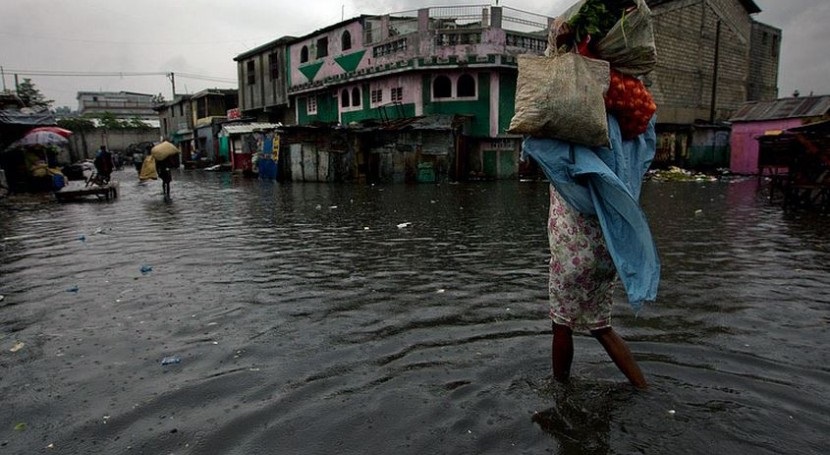An innovative model allows the fair distribution of costs for preparedness for natural disasters in the Caribbean
An innovative model allows the fair distribution of costs for preparedness for natural disasters in the Caribbean
The research, which is committed to multinational collaboration to better respond to increasing natural disasters in the region, based on joint advanced provision of emergency supplies, is led by Jessica Rodríguez-Pereira, a researcher with the UPF Department of Economics and Business.

Jessica Rodríguez-Pereira, a postdoctoral researcher at the UPF Department of Economics and Business and member of the Business Analytics Research Group (BARG), is the first author of a study that proposes a new mechanism for multinational partnerships to better prepare and share costs in the face of increasing natural disasters in the Caribbean region, as a result of climate change.
“To fairly allocate costs, both the level of risk associated with disasters and the economic capacity of partners to pay their premiums must be taken into account”.
Given the increasing frequency and intensity of natural disasters, collaborative practices can provide an effective and equitable way of pooling risks and resources. To achieve this goal, any collaborative association must provide its participating members with benefits, and the benefits and costs of the association must be shared equitably among all members. In this regard, the Caribbean region, which is facing growing disaster threats due to climate-related events, has pledged to share its resources for regional integration.
Inspired by these regional integration efforts for natural disaster management in the Caribbean, an area that includes several vulnerable and fragile developing countries with very diverse profiles in terms of risk and economic status, this study focuses on establishing a multinational disaster preparedness partnership through joint advanced provision of emergency supplies.
The study, published by Jessica Rodríguez-Pereira in the journal Production and Operations Management, together with Burcu Balcik (Özyeğin University of Istanbul, Turkey) and Marie-Ève Rancourt and Gilbert Laporte (HEC Montreal, Canada), has been conducted in collaboration with the Caribbean Disaster and Emergency Management Agency (CDEMA), which is interested in creating a methodology to equitably (fairly) allocate the costs necessary to each of the countries to put this commitment into practice.
“In this context of regional association, to fairly allocate costs, both the level of risk associated with disasters and the economic capacity of partners to pay their premiums must be taken into account”, Jessica Rodríguez-Pereira states.
An innovative cost allocation methodology
The study presents and compares alternative methods of cost allocation among partner countries. Specifically, it adapts some techniques, such as the Shapley value, the equal profit method, and the alternative cost avoided method, and also proposes a new insurance-based allocation scheme to determine the contributions by member countries.
“The proposed cost-sharing mechanism not only achieves superior solutions compared with other methodologies with respect to equity metrics, but is also computationally efficient”
This new method is formulated as a linear programming model and sets country premiums by considering the expected value and the standard deviation of country demands and their gross national income.
The research discusses the structural properties of these methods and numerically evaluates their performance in achieving an equitable allocation scheme with respect to three equity indicators based on the Gini coefficient. “The proposed cost-sharing mechanism not only achieves superior solutions compared with other methodologies with respect to equity metrics, but is also computationally efficient”, Jessica Rodríguez asserts.
Research that promotes the UN’s 17 SDG
This study especially supports the 17th UN Sustainable Development Goal (SDG), which focuses on establishing global partnerships to address the problems of developing countries.
According to Jessica Rodríguez-Pereira, “our results support the efforts of CDEMA, as they show analytically that despite the huge differences in country profiles, most of them can benefit from a collaborative network as opposed to an autonomous policy”.
The UPF researcher adds that the research provides a practical and flexible tool that helps decision-makers analyse the effects of the different weights assigned to economic and risk factors and to develop a fair and transparent financial plan to give support for the partnership and the negotiation process. “The method we have developed favours pooling financial and logistical resources, which allow improving the capacities of preparedness for and response to natural disasters”, Jessica Rodríguez-Pereira concludes.
Reference article: Rodríguez-Pereira, J., Balcik, B., Rancourt, M.È., Laporte, G. (March 2021). “A Cost-Sharing Mechanism for Multi-Country Partnerships in Disaster Preparedness”. Production and Operations Management
